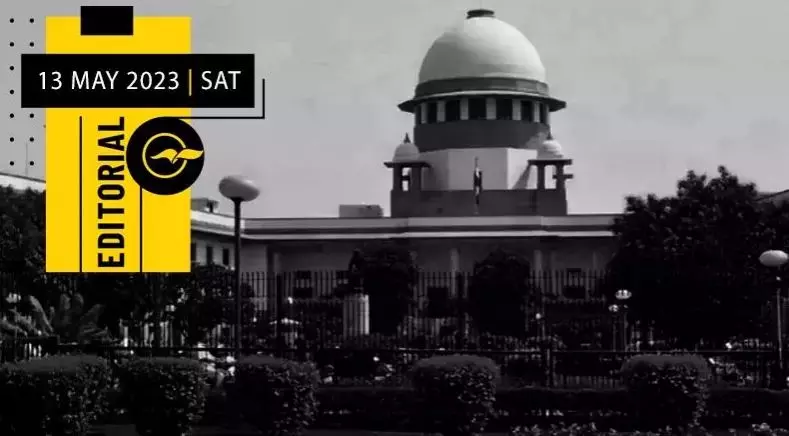
Landmark judgements by SC's Constitution Bench
text_fieldsLegal experts and civil society are viewing with keen interest the two verdicts issued by the Supreme Court's Constitution Bench issued the other day. Chief Justice D.Y. Chandrachud, who headed the Constitution Bench, emphasized the importance of federalism, which can be described as the fundamental principle of our Constitution in two judgements. The first was a legal battle between the AP government of Delhi and the Centre over jurisdiction of authority. The Court's decision in this regard was to put an end to the moves of the Modi government's using the Lieutenant Governor appointed by the President . Also in the judgment related to the Shiv Sena dispute that led to the resignation of the Uddhav Thackeray-led Mahavikas Aghadi government in Maharashtra, the Court has also put forward the position that democracy cannot be undermined by the Centre's machinations using the Governors which the court remarked would not be in the interest of democracy. These judgments are a shining defence of the judiciary against the central government's aggressive tactics of encroaching on the powers of the states through the office of Governors and central agencies. In that sense, this intervention of the judiciary represents great hope to the democratic society.
The legal battle in Delhi has been going on for the past nine years. To be more precise, it was a power struggle with the Centre that began on the day the Arvind Kejriwal-led AAP government came to power. The five-judge Constitution Bench has unequivocally ruled that the administrative power of Delhi will be vested with the democratically elected government, except for the three domains of revenue, police, and law and order, and that the Governor will be bound to implement the decisions of the government. This has brought clarity in the matter. The court has clarified that if the democratically elected government is not allowed to control the officials and hold them accountable, the government's responsibility towards the legislature and the public will be diluted. Moreover, the observation that if officials feel that they are insulated from the elected government, then they become unaccountable, underlines the basic principle of democracy that the people and their representatives are the real government. When on top of that came the court's reminder about federalism, it can be seen as a big blow to the central government. A notable observation made by the court while explaining federalism is that the two governments elected by the people to the Centre and the states through two different election processes are two types of actualisation of the people. In fact, the reluctance of the Modi government to accept these realisations of the people is the reason for the excessive exercise of power by the Centre.
In a similar vein, the apex court also pointed out the inappropriateness of the Governor's undue interference in the partisan political dispute in Maharashtra. This judgment is of great significance in the context of the continuous reactionary tendencies of the central government to encroach on the jurisdiction of the states and destroy the federal character of the country. It appears that the BJP's political policy is to interfere unnecessarily in the day-to-day affairs of state governments where they are not in power by using governors and central agencies. This tendency of the Centre has been sufficiently in display since Modi assumed power in 2014. The Centre has attempted 'parallel governance' through the Raj Bhavan in Kerala, Tamil Nadu, Maharashtra, and West Bengal. The respective state governments have repeatedly exposed this approach, which is a threat and disruption to government's conduct of business. In a sense, this was a strong political defence. However, the Delhi government went a step further by taking the matter to court and began a historic legal battle, which turned successful. Such court judgments provide comfort and hope when democratic India is losing ground in all areas under Hindutva fascism.

























